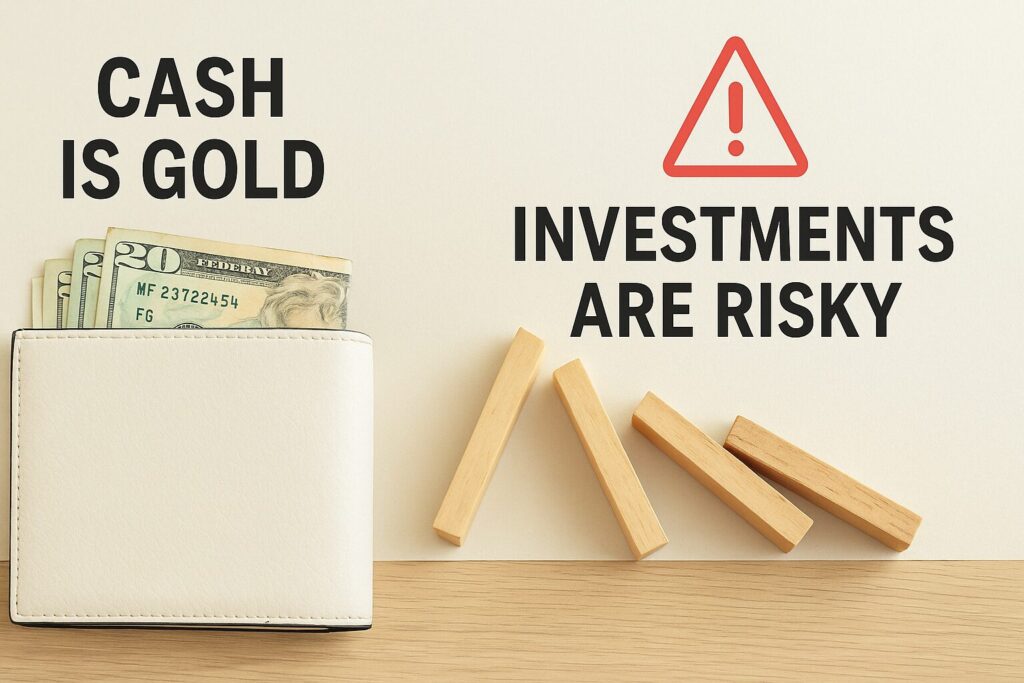
Why Holding Some Cash in Retirement Might Be the Smartest Move You Make
Welcome to “Money Myths Retirees Still Believe”—a blog series that uncovers the hidden beliefs that can quietly sabotage your financial peace of mind.
Many retirees cling to common money myths that seem true but can lead to poor decisions, lost income, or unnecessary worry. Each post in this series explores one myth—like “cash is trash” or “I need to beat the market”—and replaces it with a smarter, simpler mindset.
If you’re retired or nearing retirement, this series will help you reassess your approach and feel more confident about your financial future.
The Myth: “Cash Is Trash”
Doug had done everything right—or so he thought. At 67, he had his retirement funds mostly in dividend stocks and bond funds. But when the market dipped sharply in 2022, and his monthly withdrawals lined up with falling prices, he panicked. Selling at a loss to cover living expenses felt awful. He asked his advisor what went wrong.
“You’re too heavily invested,” the advisor admitted.
“You need more cash.”
Doug was stunned. He’d spent years hearing that cash was a waste—that it earned next to nothing and lost value to inflation.
He believed the myth: “Cash is trash.”
But in retirement, cash is far from garbage. It’s gold—if you use it right.
Where This Myth Comes From
It’s true that, in terms of long-term returns, cash underperforms. Stocks and bonds usually offer higher growth and income. Inflation slowly eats away at the value of your dollars over time. Financial pundits often mock cash as a “dead asset.”
But here’s the key: retirement is no longer a race for the highest return. It’s about control, flexibility, and peace of mind.
And that’s exactly what cash gives you.
What Cash Actually Does for Retirees
Cash isn’t there to make you rich. It’s there to:
- Buy you time when markets are down so you don’t have to sell investments at a loss.
- Cover emergencies without tapping your portfolio.
- Provide steady income in the near-term while longer-term investments recover or grow.
- Offer psychological comfort, so you don’t panic during downturns.
It acts like a financial cushion. A shock absorber. A seatbelt.
Imagine going through a recession without worrying how to pay next month’s bills. That’s what a cash reserve does.
How Much Cash Should You Hold?
There’s no one-size-fits-all number, but here are a few smart guidelines for retirees:
- 6 to 12 months of expenses in a checking or savings account.
- 1–2 years of living costs in a high-yield savings account or money market fund, especially for your short-term bucket (if you’re using the bucket strategy).
- Enough cash to cover any big known expenses in the next year or two (car, roof repair, travel).
That way, if your investments drop, you don’t have to touch them. You let them recover while your cash covers your needs.
A Real-Life Example
Linda, a 72-year-old widow in Arizona, keeps about 18 months’ worth of expenses in cash. Her friends teased her for being too conservative. But during the 2020 COVID market crash, she didn’t lose a wink of sleep. She didn’t sell a single stock. She paid her bills from her cash reserve, waited patiently, and watched her investments bounce back a year later.
“Cash didn’t make me money,” she said, “but it saved me from making a big mistake.”
The Takeaway
Cash may not grow like stocks or pay dividends like bonds—but it plays a powerful role in retirement.
In truth, cash isn’t trash—it’s your safety net, your buffer, your fallback.
Having it means you don’t need to guess what the market will do next month.
It means you can respond, not react.
It means you get to live with confidence instead of fear.